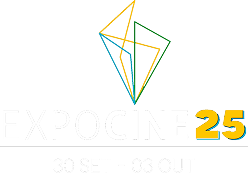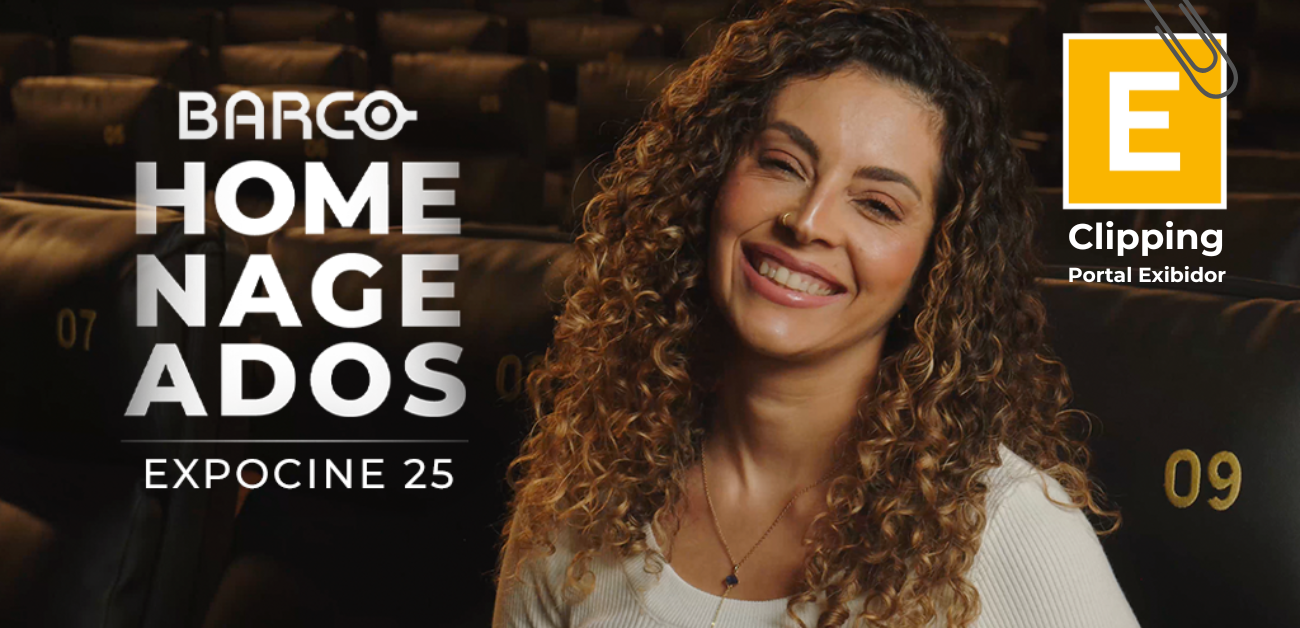Gisele Freitas talks about the tribute to the company that will take place at Expocine 2025
When we discuss cinema, the protagonists are usually the films, their stories, and their talents. In our industry, however, exhibition and distribution are often the central characters in a multifaceted plot. Even so, we need to talk about the supporting actors who make the story unfold. In our market segment, these are the companies that develop and offer technology, such as Barco , which will be honored this year at EXPOCINE 25 , in recognition of the work that helps make the cinematic experience possible and more enjoyable.
Continuing the interviews with Expocine , Portal Exibidor Barco 's sales manager in Brazil. In fact, the 12th edition of the largest Latin American film industry event also marks the first time that suppliers will be honored. Barco , along with Dolby (whose interview will be published in a few weeks), will be the first companies to be honored.
It is worth noting that, while some questions were asked by our editorial team, part of the interview was taken from the OdeioCinema podcast , which is showing episodes from a partnership between the AdoroCinema and Tonks , the conglomerate that owns the rights to Expocine and the Exhibition Portal .
" Expocine is the most important meeting place for the film industry in Latin America. It's more than a trade show: it's a space where exhibitors, distributors, suppliers, and experts exchange ideas, learn about new technologies, and discuss trends shaping the future of cinema. It's also a strategic opportunity to strengthen relationships and create connections that would be difficult to achieve in any other context," comments Gisele.
Barco , serving medical monitors, control rooms, and, as we know, cinema projectors, among other applications. Founded in 1934, the Belgian American Radio Corporation has shifted its focus over time and is now a leading player in the world of film.
"Barco tries not only to make a sale to the customer, because selling projectors is just about arriving there and installing a machine. That's never our intention; we always try to sit down with our customers to provide a better experience, both for the theater owner (who are sometimes family-owned businesses) and for theaters that are already international and part of very large chains. What we try to do is provide consulting services to the theater owner who is going to set up a theater. Because the projector depends much more on the technology; we need to know which screen the customer will use, what distance they will have from the projector. Everything is very well thought out and calculated to provide the best experience for the theater," explains Gisele.
For optimal performance, the projector needs to be well calibrated, as it must have the necessary brightness, contrast, and ability to convey the director's intended film. Barco strives to think ahead. Before launching a new technology, it means years of research and numerous engineers have been involved in ensuring that the technology works optimally.
More than that, the executive explains that each sale needs to be personalized: "It's a very customized sale; it needs to be analyzed point by point. Typically, theaters send us the floor plans while they're still building the rooms. They send the floor plans, we analyze them, calculate them, and conclude: 'Look, this is the most recommended projector for this room.' And there's the issue of the lens, which also changes. So, depending on the lens, there needs to be more focus or less focus. We have several types of lenses to suit the projector."
will complete 15 years at Barco in 2025, joined the company as an intern. Because of this, she's one of the most knowledgeable people to discuss the transition from reel-to-reel projectors to digital. This is because the digitalization of the exhibition industry began exactly the year she joined Barco , in 2010.
"I followed the entire transition period, but I was very new to the company when the VPF (Virtual Print Fee) came about in Brazil. It was a collaboration between theater owners and studios to facilitate this technology exchange. For those who don't know, projectors used to be 35mm roll film. Until 2010, they were roll film. I never worked with roll film projectors, but when I joined, in 2010, this transition was just beginning, and everything was very uncertain. People didn't know because everyone was used to 35mm film, which was a large object; the projector was also a large object. And from then on, this new restructuring began to move to digital projectors," explains Gisele.
At the time, the exhibition center received help from the distributors/studios themselves to digitize their theaters. This was due to the high logistics costs involved in distributing films, as film reels were large and heavy, making transportation more expensive. Knowing that from that moment on, everything would be digital, with the transportation of a simple hard drive (nowadays, with the even more viable option of satellite distribution), lowering costs, a partnership was formed to ensure exhibitors could embrace the new technology as quickly as possible.
"Today we have laser projectors, but in the first wave of digitalization, they were lamp-based projectors, which are bulbs that have to be replaced inside the projector. So, the lamp, depending on the projector model, lasts between 3,000 and 6,000 hours of film playback. As it reaches the middle of its lifespan, the brightness quality drops a bit. So, towards the end, it has to be replaced. These replacements are no longer necessary these days. Since 2023 or so, we've been experiencing a new trend, which is the replacement of lamps for laser projectors, which are more sustainable. Now, there's no longer such a thing as replacing the lamp, because when you replace the lamp, you also have to find a place to dispose of it properly," explains Gisele.
Barco projector using a retrofit kit. This way, exhibitors with older equipment can, for a smaller investment, access the latest technology, achieving superior image quality in their theaters.
Additionally, the company has been launching HDR technology for theaters since last year. Unlike other technologies, this one is applied during the filming process, with the director employing Barco's HDR technology right from the start. The film, shown on an HDR projector, will have even higher quality, making the experience even more immersive.
And, speaking of experience, the executive highlighted the importance of cinema as an event. "There was a lot of talk in the past about streaming competing with cinema, but we don't see it that way. When people want to leave the house, they want an experience. So, cinema's competitors are a soccer match, a concert, anything that takes that family or individual out of the house to provide an experience. And cinema is this, so much so that it has been remodeled, precisely to have more comfortable seats, to have better technology. When people go to the cinema, they want really cool sound, really cool projection. They want to have the experience of being in that environment with the people they love, with friends, with family, but they want to leave the house to have an experience. And it's been shown that when there's a really important film, people go. We saw this with 'Inside Out 2,' which brought 20 million viewers to the theater. 'Barbie' was also a film that you saw a pink wave in the theater. So, people go to have this experience, this magic of cinema, a magic they'll never have at home."
In the short term, exhibitors can expect Barco to offer projection solutions that combine superior image quality, lower energy consumption, and flexible business models, specifically designed for the Brazilian market. In the longer term, the company's focus is to remain a leader in innovation, bringing immersive, sustainable technologies to the market that elevate the cinematic experience to a new level, while always maintaining close ties with customers and understanding their true needs.
Barco will be present at EXPOCINE 25 as a guest of honor, but also at the Business Fair (at the Renaissance Hotel) and, just like last year, will be naming the place where the distributors' presentations will be held, Sala Barco , at Cine Marquise , and will also offer a cocktail party at the end of October 1st, the second of the event.
"It's a tremendous honor and a very special recognition for the entire Barco team. Being the first company to receive this award in this category shows that our commitment to the Brazilian market goes beyond providing technology: we are present as partners, listening, supporting, and always seeking customized solutions for each client. This recognition reinforces that we're on the right track and motivates us to continue innovating and investing in the sector," concludes Gisele.


